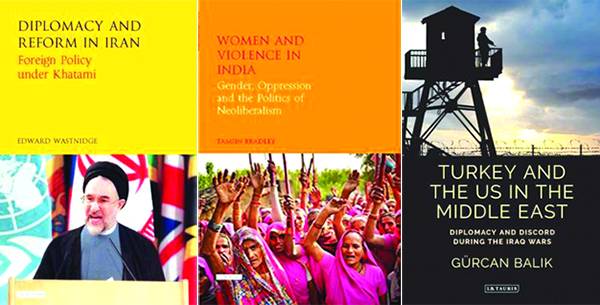
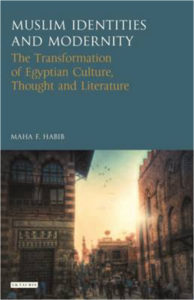
Muslim Identities and Modernity: The Transformation of Egyptian Culture, Thought and Literature
Maha Habib
I.B.Tauris & Co Ltd. (2016)
Rs11,524
What have the concepts of modernity and secularization meant for Islamic tradition, culture and society? How have the discourses which surround all of these issues influenced Muslim self-perception and individual identity? There have been many attempts to describe and analyse the encounter between Islam and modernity in the Middle East, but few have been able so effectively to explore the impact this has on the idea and reality of religious identity and individual religiosity. Maha F. Habib examines modernity from this angle, offering socio-cultural, philosophical and literary perspectives. She assesses how this is played out in Egypt, analysing cultural changes in the country through its intellectual thought and literature, from the nineteenth century to the present day. Her references to the works of Muhammad Abdu, Muhammad Husayn Haykal, ‘Abbas Mahmud al-’Aqqad, Naguib Mahfouz, Alaa al-Aswany and Salwa Bakr reveal contemporary issues and concerns which will interest those researching the cultural and social milieu of modern Egypt.
Maha F. Habib is a Lecturer at the University of Waterloo in Canada. Previously a Researcher at York University in Toronto, she holds a PhD in Arab and Middle Eastern Studies from the University of Exeter.
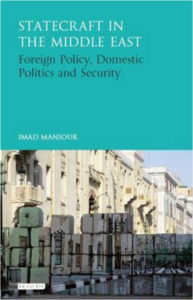
Statecraft in the Middle East: Foreign Policy, Domestic Politics and Security
Imad Mansour
I.B.Tauris & Co Ltd. (2016)
Rs9,834
What role do ideas play in state-building and state activity? This book argues that government policies in both foreign relations and domestic politics must always be situated within a broader ideational and societal context. Imad Mansour analyses how governments in the contemporary Middle East have governed internally and acted externally based on societal narratives, which bring together a variety of ideas about a society’s history and place in the world. He argues that there is a dominant societal narrative that acts as a primary building block of statecraft, where statecraft is understood as an ongoing set of local, regional and global state-building processes. Mansour investigates the ways in which statecraft in the Middle East has been guided by narratives through a close historical reading and comparative discussion of the political activity of six states - Egypt, Israel, Syria, Turkey,Saudi Arabia and Iran - in the second half of the twentieth century and the early twenty-first century. His book demonstrates the analytical power of narratives in understanding statecraft and explains why governments’ decisions need to be understood in complex ways.
Imad Mansour is Assistant Professor of International Affairs at the University of Qatar. He has been a Visiting Professor at the Campus Moyen-Orient Mediterranee of the Institut d’Etudes Politiques de Paris (Sciences Po Paris) and holds a PhD from McGill University where he was also Faculty Lecturer. He previously studied at the American University of Beirut.
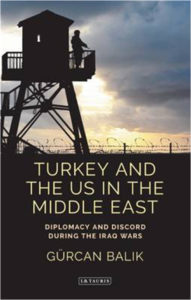
Turkey and the US in the Middle East: Diplomacy and Discord During the Iraq Wars
Gurcan Balik
I.B.Tauris & Co Ltd. (2016)
Rs10,602
Written by the former chief foreign policy advisor to the Turkish president and based on unprecedented access to official documents and communiques, this book gives the inside story of Turkish US relations from the first Gulf War, through debates on the Iraqi Kurdish question, the 2003 invasion of Iraq and into the present day. Using events in Iraq as the basis for a theoretical case study, Gurcan Balik argues that Turkey influenced US foreign policy on several key occasions, and that Turkish support was instrumental in the first intervention in Iraq. After Iraq’s 1991 uprisings, however, Turkey’s interests in the Middle East began to diverge from those of the US, and their relationship gradually deteriorated, evident in Turkey’s refusal to open up its northern border to aid the US advance to Baghdad in 2003. Balik contends that an ‘Iraq gap’ then emerged, which has since had major implications for the Turkish economy and for the future of the Middle East.Turkey and the US in the Middle East contains hitherto unpublished primary source material, and is an essential addition to the scholarship of the period.”
Gurcan Balik was the chief foreign policy advisor to President Abdullah Gul and has held a number of key diplomatic posts in Turkey. He recently completed a PhD in War Studies at King s College London.
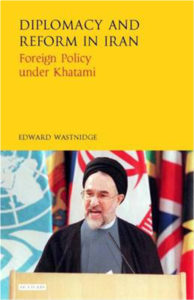
Diplomacy and Reform in Iran: Foreign Policy Under Khatami
Edward Wastnidge
I.B.Tauris & Co Ltd (2016)
Rs9,834
Nuclear power has for the most part dominated Western media and academic analyses concerning Iranian foreign policy in recent years. This focus, however, can be misleading, especially as regards the early presidency of Mohammad Khatami (1997-2005). In a riposte to Samuel Huntington’s ‘Clash of Civilisations’ theory, Khatami proposed that there ought to be a ‘Dialogue among Civilisations’. In this book, Edward Wastnidge examines Khatami’s proposition, derived from the contemporary Iranian polymath Dariush Shayegan, not as a philosophical suggestion, but as a real foreign policy tool that enabled Khatami to make overtures towards the US. Across bilateral and multilateral examples, he explores its specific application and how it was used to create foreign policy and aid diplomacy. Furthermore, by placing the development of the idea within Iran’s domestic political context, Wastnidge is also able to shed light onto the rise of the reform movement during this period. Based on extensive research, Diplomacy and Reform in Iran is a timely contribution to scholarship, and important reading for students and researchers of contemporary Iran and the complexities of Iranian foreign policy.
Edward Wastnidge joined the Department of Politics and International Studies in November 2013. Prior to this he held positions at Manchester Metropolitan University, Keele University and the University of Manchester. He also previously worked for the Open University as an Associate Lecturer. Edward is currently the Qualifications Director for the Open University’s International Studies programme
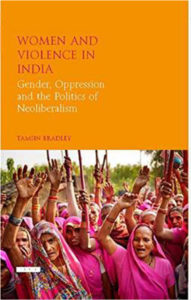
Women and Violence in India: Gender, Oppression and the Politics of Neoliberalism
Tamsin Bradley
I.B.Tauris & Co Ltd. (2017)
Rs10,602
India’s endemic gender-based violence has received increased international scrutiny and provoked waves of domestic protest and activism. In recent years, related studies on India and South Asia have proliferated but their analyses often fail to identify why violence flourishes. Unwilling to simply accept patriarchy as the answer, Tamsin Bradley presents new research examining how different groups in India conceptualise violence against women, revealing beliefs around religion, caste and gender that render aggression socially acceptable. She also analyses the role that neoliberalism, and its corollary consumerism, play in reducing women to commodity objects for barter or exchange. Unpacking varied conservative, liberal and neoliberal ideologies active in India today, Bradley argues that they can converge unexpectedly to normalise violence against women. Due to these complex and overlapping factors, rates of violence against women in India have actually increased despite decades of feminist campaigning.
This book will be crucial to those studying Indian gender politics and violence, but also presents new data and methodologies which have practical implications for researchers and policymakers worldwide.
Tamsin Bradley is Senior Lecturer in International Development Studies at the University of Portsmouth. Her previous books include Gender and Religion in Developing Societies: Faith-based Organisations and Feminism in India (I.B.Tauris, 2010) and Challenging the NGOs: Women, Religion and Western Dialogues in India (I.B.Tauris, 2006).

